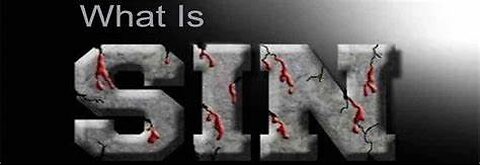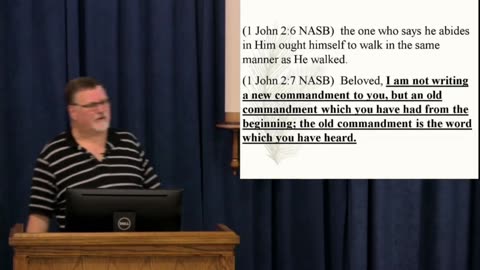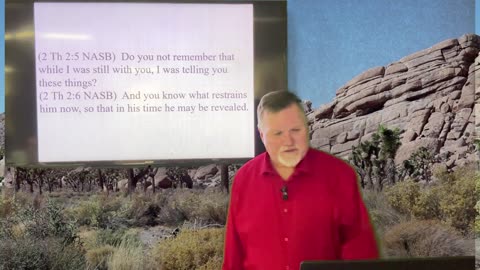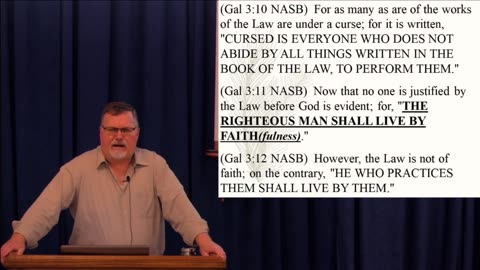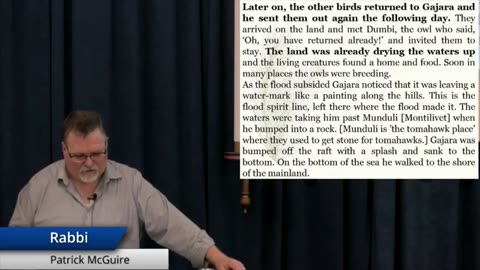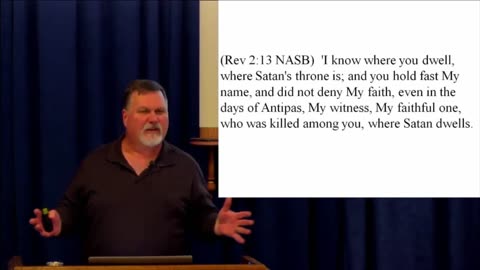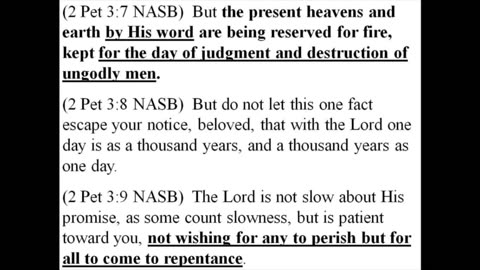-
Sin- What is it? It's not what you think. You won't understand the Bible if you don't know it. 2025
 RVTARiver Valley Toray Assembly https://youtu.be/Vzq86Nui3BQ15 views
RVTARiver Valley Toray Assembly https://youtu.be/Vzq86Nui3BQ15 views -
The 4 Horsemen of Revelation 2025
 RVTAhttps://youtu.be/xw1s-8fuNs4 Click the above link for the video in its entirety! River Valley Torah Assembly10 views
RVTAhttps://youtu.be/xw1s-8fuNs4 Click the above link for the video in its entirety! River Valley Torah Assembly10 views -
-
-
-
Abomination of Desolation – It is veiled to those who are perishing! 2025
 RVTA2 Corinthians 4:3-4 And even if our gospel is veiled, it is veiled to those who are perishing, 4in whose case the god of this world has blinded the minds of the unbelieving, that they might not see the light of the gospel of the glory of Christ, who is the image of God. River Valley Torah Assembly15 views
RVTA2 Corinthians 4:3-4 And even if our gospel is veiled, it is veiled to those who are perishing, 4in whose case the god of this world has blinded the minds of the unbelieving, that they might not see the light of the gospel of the glory of Christ, who is the image of God. River Valley Torah Assembly15 views -
Control & Manipulation - "faith in order to be saved" They made it mystical, emotional & captivating
 RVTAOne of the most egregious examples of this translational conspiracy (if one can call it that) is the passage in the Tanakh that translates the Hebrew word "emunah" as "faith" Hab 2:4). Faith - H530. emunah, [53c]; from H539; firmness, steadfastness, fidelity:-- faith(1), faithful(3), faithfully(8), faithfulness(25), honestly(1), responsibility(m)(1), stability(m)(1), steady(1), trust(2), truth(5). This is the only time in the Tanakh that this word is translated as "faith." The word means "faithfulness" or some derivative thereof. However, it is translated as "faith" here because it is quoted three times in the Brith Hadasha. Apparently Christian translators simply cannot have people living by faithfulness to the Father and living by faithfulness through Messiah because that commands obedience. The masses can be far better controlled and manipulated by telling them they must have "faith in order to be saved" because it is much more mystical, emotional, captivating, and impossible to fully grasp. The mystical and mysterious word "faith," should be translated as "faithfulness." when they used the word faith instead of faithfulness, what were they thinking? Conspiracy? Psa 25:5: The Hebrew word for "truth" is emeth. It is a very telling word because it is not only translated as "truth," but it is also often translated as "faithfulness." Truth - H571. emeth, [54a]; from H539; firmness, faithfulness, truth:-- correctly(m)(1), faith(1), faithful(2), faithfully(6), faithfulness(10), This passage is a very interesting one used often in Christianity. The Hebrew word for "faith" is emunah. Faith - H530. emunah, [53c]; from H539; firmness, steadfastness, fidelity:-- faith(1), faithful(3), faithfully(8), faithfulness(25), honestly(1), responsibility(m)(1), stability(m)(1), steady(1), trust(2), truth(5). This is the only time in the Tanakh that this word is translated as "faith." The word means "faithfulness" or some derivative thereof. However, it is translated as "faith" here because it is quoted three times in the Brith Hadasha. In the first quote, the word translated as "faith" from the Greek word, pistis, and is used three times. In that passage it only makes sense to be translated as "faithfulness" instead of "faith" Romans 1:17 In the next passage that Habakkuk 2:4 is quoted in the Brit Hadasha, it only makes sense that it be "faithfulness" also Gal 3:11-12 And lastly Heb. 10:38. The ONLY reason that the Hebrew word "emunah" is translated as "faith" in Habakkuk 2:4 is because Christian translators do not want the term "faithfulness" (meaning that some action and behavior is required) to be applied to Christianity. They would rather have the mystical, cloudy, vagueness of "faith" to be their marketing tool. If some did not show faithfulness, does that nullify Elohim's faithfulness? May it never be. In this case, even the Ryrie Study Bible says that the Greek word for "unbelief" means "unfaithful:" "unbelief. May also mean "were unfaithful.""Pistis is translated almost always as the mystical and mysterious word "faith," when it should be translated as "faithfulness." There are only three times that the Brit Hadasha translates pistis as "faithfulness." This passage and Matt. 23:23. and Galatians 5:22-23. In those three cases, the word commanded action, therefore the emotional word "faith" does not fit. Faithfulness - G4102. pistis, from G3982; faith, faithfulness:-- faith(238), faithfulness(3), pledge(m)(1), proof(1). The fact of the matter is that both Greek words "pistis" and "pisteo" that are almost always translated as "faith" and "believe" are actually Greek actions words and not passive emotional words. It is painfully obvious in this verse (Romans 3:3) that "pistis" MUST be "faithfulness", and not "faith." Actually, it is painfully obvious in all of Scripture that "pistis" should be translated as "faithfulness" or "fidelity" instead of "faith." If the translators of Scripture had done so, they would have taken the mystery and intrigue out of a religion that they had so carefully crafted as deception to the billions of people throughout the centuries. Look at how the meanings of the most quoted passages change and lose their mystique and become very "real" when we see that all Elohim requires is for us to be faithful to Him by being obedient to His commandments (Torah). John 3:16, 36, 14-18, Ep. 2:8-10, Romans 10:8-10, John 6:47). River Valley Torah Assembly38 views 1 comment
RVTAOne of the most egregious examples of this translational conspiracy (if one can call it that) is the passage in the Tanakh that translates the Hebrew word "emunah" as "faith" Hab 2:4). Faith - H530. emunah, [53c]; from H539; firmness, steadfastness, fidelity:-- faith(1), faithful(3), faithfully(8), faithfulness(25), honestly(1), responsibility(m)(1), stability(m)(1), steady(1), trust(2), truth(5). This is the only time in the Tanakh that this word is translated as "faith." The word means "faithfulness" or some derivative thereof. However, it is translated as "faith" here because it is quoted three times in the Brith Hadasha. Apparently Christian translators simply cannot have people living by faithfulness to the Father and living by faithfulness through Messiah because that commands obedience. The masses can be far better controlled and manipulated by telling them they must have "faith in order to be saved" because it is much more mystical, emotional, captivating, and impossible to fully grasp. The mystical and mysterious word "faith," should be translated as "faithfulness." when they used the word faith instead of faithfulness, what were they thinking? Conspiracy? Psa 25:5: The Hebrew word for "truth" is emeth. It is a very telling word because it is not only translated as "truth," but it is also often translated as "faithfulness." Truth - H571. emeth, [54a]; from H539; firmness, faithfulness, truth:-- correctly(m)(1), faith(1), faithful(2), faithfully(6), faithfulness(10), This passage is a very interesting one used often in Christianity. The Hebrew word for "faith" is emunah. Faith - H530. emunah, [53c]; from H539; firmness, steadfastness, fidelity:-- faith(1), faithful(3), faithfully(8), faithfulness(25), honestly(1), responsibility(m)(1), stability(m)(1), steady(1), trust(2), truth(5). This is the only time in the Tanakh that this word is translated as "faith." The word means "faithfulness" or some derivative thereof. However, it is translated as "faith" here because it is quoted three times in the Brith Hadasha. In the first quote, the word translated as "faith" from the Greek word, pistis, and is used three times. In that passage it only makes sense to be translated as "faithfulness" instead of "faith" Romans 1:17 In the next passage that Habakkuk 2:4 is quoted in the Brit Hadasha, it only makes sense that it be "faithfulness" also Gal 3:11-12 And lastly Heb. 10:38. The ONLY reason that the Hebrew word "emunah" is translated as "faith" in Habakkuk 2:4 is because Christian translators do not want the term "faithfulness" (meaning that some action and behavior is required) to be applied to Christianity. They would rather have the mystical, cloudy, vagueness of "faith" to be their marketing tool. If some did not show faithfulness, does that nullify Elohim's faithfulness? May it never be. In this case, even the Ryrie Study Bible says that the Greek word for "unbelief" means "unfaithful:" "unbelief. May also mean "were unfaithful.""Pistis is translated almost always as the mystical and mysterious word "faith," when it should be translated as "faithfulness." There are only three times that the Brit Hadasha translates pistis as "faithfulness." This passage and Matt. 23:23. and Galatians 5:22-23. In those three cases, the word commanded action, therefore the emotional word "faith" does not fit. Faithfulness - G4102. pistis, from G3982; faith, faithfulness:-- faith(238), faithfulness(3), pledge(m)(1), proof(1). The fact of the matter is that both Greek words "pistis" and "pisteo" that are almost always translated as "faith" and "believe" are actually Greek actions words and not passive emotional words. It is painfully obvious in this verse (Romans 3:3) that "pistis" MUST be "faithfulness", and not "faith." Actually, it is painfully obvious in all of Scripture that "pistis" should be translated as "faithfulness" or "fidelity" instead of "faith." If the translators of Scripture had done so, they would have taken the mystery and intrigue out of a religion that they had so carefully crafted as deception to the billions of people throughout the centuries. Look at how the meanings of the most quoted passages change and lose their mystique and become very "real" when we see that all Elohim requires is for us to be faithful to Him by being obedient to His commandments (Torah). John 3:16, 36, 14-18, Ep. 2:8-10, Romans 10:8-10, John 6:47). River Valley Torah Assembly38 views 1 comment -
Ancient Aboriginal Flood Legend. One of the many accounts of a flood in a cultures history. 2023
 RVTAWatch as we examine the stunning Aboriginal Flood Legend by: Howard Coates.11 views
RVTAWatch as we examine the stunning Aboriginal Flood Legend by: Howard Coates.11 views -
Lake of Fire- Those against Israel and followers of Islam will be thrown into the lake of fire. 2016
 RVTALake of fire - those who are against Israel and are followers of Islam. They will be thrown alive into the lake of fire and brimstone. Yeshua says not to be afraid of those who can kill you, but be afraid of the One who can cast you into hell. The Greek term for "hell" here is "Gehenna." Gehenna is a valley west and south of Jerusalem which was usually kept burning because it was used as a trash dump. Here it is used to represent the Lake of Fire at the final judgment. Fearing Elohim who can cause eternal death above all else is a common theme in the Tanakh. Isaiah 51:7-13 Prov 14:26-27 Jer 5:22-25 Prov 1:7 Prov 2:1-5 Rev 2:13 Yeshua commends this assembly for three very definite things. He takes note of their circumstances. They dwelled "where Satan's throne is." Religion was big business in Pergamum in that day and apparently Satan's headquarters were there. Satan is not in hell. The lake of fire is not open for business yet. Satan will be cast into that lake of fire much later which we will see in chapter 20. Right now, Satan is loose and ruling the kingdoms of this world, roaming the world like a roaring lion looking for whom he may devour. But he does have headquarters. Messiah says that it was in Pergamum in that time. One would logically think that Satan has moved his throne to someplace like Hollywood. But, in actuality, he is thriving in the Middle East under the name of "Allah." The reason Messiah said it was Satan's throne was because of the heathen temples constructed there. The temples to Athena, Caesar Augustus, and Hadrian were located there as well as the altar to Zeus. Other interesting sites included the temple of Dionysus. Dionysus was the goat-god. He was depicted with horns, but the upper part was a man while the lower part was a goat, with cloven feet and a tail. This is the modern picture we have of Satan with a pitch fork, horns, and a tail. We got this picture from the goat-god, Dionysus. Another outstanding site was the temple to the god Asklepios, from which we get our word "scalpel." This was the greatest hospital in the ancient world. The Greek god Asklepios was a man, but the Oriental god Asklepios was a serpent. In Pergamum it was a serpent. They used medicine and psychology in that hospital. "And you hold fast to My name, and did not deny My faith." They were faithful in their defense of the deity of Messiah. "Even in the days of Antipas, My witness, My faithful one, who was killed among you, where Satan dwells." We don't know anything about Antipas at all. He apparently was a martyr in Pergamum. Rev 19:20 Rev 20:10 Satan will be thrown into the lake of fire and brimstone along with Islam and its armies. We are told in Ezekiel that they will be a great sacrifice of Elohim. Ezek 39:17-19 Yeshua states that evil men will be cut into two pieces as a sacrifice is done according to a covenant. Matt 24:50-51 Luke 12:46 Lev 6:12-13 This picture of the lake of fire and brimstone is also given in Isaiah 66:24. Isaiah 66:24 The mark of the beast and those who worshiped his image; these two were thrown alive into the lake of fire which burns with brimstone. The beast and the false prophet are the entity of the Muslim Empire. Whether this includes all those who are Muslim or the Muslims who are a part of the armies going against Israel is unsure. It would appear that the wording refers to those who are against Israel and followers of Islam. They will be thrown alive into the lake of fire and brimstone. Rev 20:14 Death and Hades are thrown into the lake of fire. Sheol, or hades (which is translated "hell" in the Brit Hadashah) is the place of the dead, or the grave. It says that Death (personified here) is also going to be thrown into the lake of fire. Death and the grave have always been man's great enemies. Elohim is going to do away with death and the grave now. Rev 20:15 Is this going to be a literal lake of fire? It is likely to be the condition of the earth as it is judged and all things were made new. In the same manner that the earth became a watery grave for all of mankind about four thousand years ago, it is very possible that the earth, as it is being renewed by fire, will be the fiery grave of those who reject Elohim, His ways, and the Messiah He gave us. The second death means eternal and absolute separation from Elohim. It appears to mean total annihilation. Rev 21:8 There will be no room for lawlessness in the eternal state. It will be locked out forever. These last two verses were previously stated in Ezekiel 11:19-21. This is the last occurrence of the word "fire" in Scripture and it is referring to the lake of fire and burning brimstone. The first time "fire" is used in Scripture is when Elohim destroyed Sodom and Gomorrah with fire and burning brimstone. River Valley Torah Assembly36 views
RVTALake of fire - those who are against Israel and are followers of Islam. They will be thrown alive into the lake of fire and brimstone. Yeshua says not to be afraid of those who can kill you, but be afraid of the One who can cast you into hell. The Greek term for "hell" here is "Gehenna." Gehenna is a valley west and south of Jerusalem which was usually kept burning because it was used as a trash dump. Here it is used to represent the Lake of Fire at the final judgment. Fearing Elohim who can cause eternal death above all else is a common theme in the Tanakh. Isaiah 51:7-13 Prov 14:26-27 Jer 5:22-25 Prov 1:7 Prov 2:1-5 Rev 2:13 Yeshua commends this assembly for three very definite things. He takes note of their circumstances. They dwelled "where Satan's throne is." Religion was big business in Pergamum in that day and apparently Satan's headquarters were there. Satan is not in hell. The lake of fire is not open for business yet. Satan will be cast into that lake of fire much later which we will see in chapter 20. Right now, Satan is loose and ruling the kingdoms of this world, roaming the world like a roaring lion looking for whom he may devour. But he does have headquarters. Messiah says that it was in Pergamum in that time. One would logically think that Satan has moved his throne to someplace like Hollywood. But, in actuality, he is thriving in the Middle East under the name of "Allah." The reason Messiah said it was Satan's throne was because of the heathen temples constructed there. The temples to Athena, Caesar Augustus, and Hadrian were located there as well as the altar to Zeus. Other interesting sites included the temple of Dionysus. Dionysus was the goat-god. He was depicted with horns, but the upper part was a man while the lower part was a goat, with cloven feet and a tail. This is the modern picture we have of Satan with a pitch fork, horns, and a tail. We got this picture from the goat-god, Dionysus. Another outstanding site was the temple to the god Asklepios, from which we get our word "scalpel." This was the greatest hospital in the ancient world. The Greek god Asklepios was a man, but the Oriental god Asklepios was a serpent. In Pergamum it was a serpent. They used medicine and psychology in that hospital. "And you hold fast to My name, and did not deny My faith." They were faithful in their defense of the deity of Messiah. "Even in the days of Antipas, My witness, My faithful one, who was killed among you, where Satan dwells." We don't know anything about Antipas at all. He apparently was a martyr in Pergamum. Rev 19:20 Rev 20:10 Satan will be thrown into the lake of fire and brimstone along with Islam and its armies. We are told in Ezekiel that they will be a great sacrifice of Elohim. Ezek 39:17-19 Yeshua states that evil men will be cut into two pieces as a sacrifice is done according to a covenant. Matt 24:50-51 Luke 12:46 Lev 6:12-13 This picture of the lake of fire and brimstone is also given in Isaiah 66:24. Isaiah 66:24 The mark of the beast and those who worshiped his image; these two were thrown alive into the lake of fire which burns with brimstone. The beast and the false prophet are the entity of the Muslim Empire. Whether this includes all those who are Muslim or the Muslims who are a part of the armies going against Israel is unsure. It would appear that the wording refers to those who are against Israel and followers of Islam. They will be thrown alive into the lake of fire and brimstone. Rev 20:14 Death and Hades are thrown into the lake of fire. Sheol, or hades (which is translated "hell" in the Brit Hadashah) is the place of the dead, or the grave. It says that Death (personified here) is also going to be thrown into the lake of fire. Death and the grave have always been man's great enemies. Elohim is going to do away with death and the grave now. Rev 20:15 Is this going to be a literal lake of fire? It is likely to be the condition of the earth as it is judged and all things were made new. In the same manner that the earth became a watery grave for all of mankind about four thousand years ago, it is very possible that the earth, as it is being renewed by fire, will be the fiery grave of those who reject Elohim, His ways, and the Messiah He gave us. The second death means eternal and absolute separation from Elohim. It appears to mean total annihilation. Rev 21:8 There will be no room for lawlessness in the eternal state. It will be locked out forever. These last two verses were previously stated in Ezekiel 11:19-21. This is the last occurrence of the word "fire" in Scripture and it is referring to the lake of fire and burning brimstone. The first time "fire" is used in Scripture is when Elohim destroyed Sodom and Gomorrah with fire and burning brimstone. River Valley Torah Assembly36 views -
Predestination - You don't choose Him; He chooses whom He will. 2016
 RVTAScriptures on predestination. Uploaded May 5, 202110 views
RVTAScriptures on predestination. Uploaded May 5, 202110 views
